Catch up on the Philanthropy Leadership Summit breakout sessions – Part 1
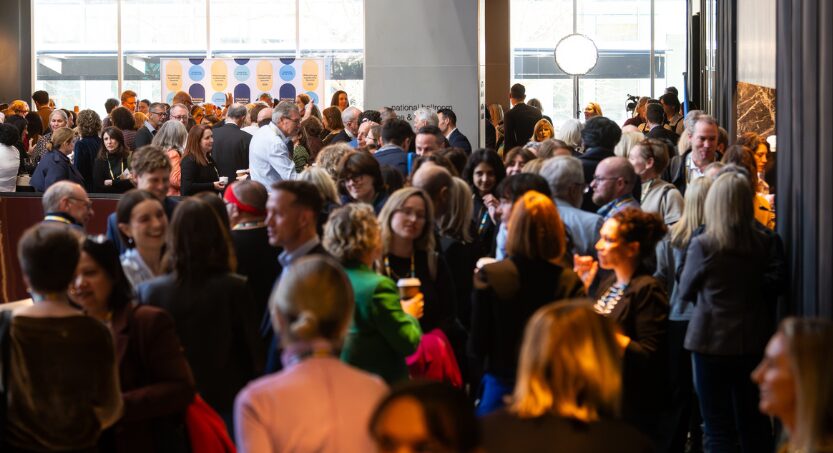
Many at the Leadership Summit said that it was almost impossible to choose between the diverse breakout session topics. So, here’s your chance to catch up on what you missed. From First Nations leadership to community-led solutions and the rise of AI, among a plethora of other topics from our ‘Deeper dive into real life leadership’ sessions – our facilitators share their reflections.
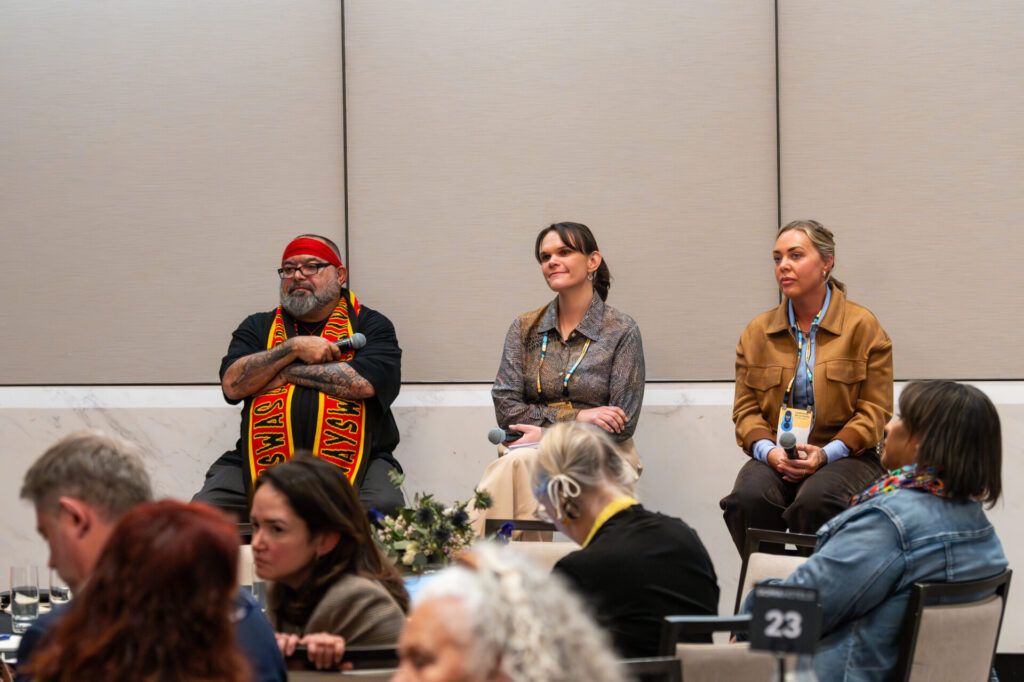
- First Nations leadership for a just, fair and sustainable Australia
Hosted by Australian Indigenous Governance Institute and supported by Philanthropy Australia.
Panellists: Leila Smith, Aurora Education, Warren Miller, Spinifex Foundation, Sarah Smith, ED, Fire to Flourish.
Reflection by Moderator Jessica Bulger, CEO, Australian Indigenous Governance Institute.
At the recent Philanthropy Australia Summit on Ngunnawal Country, I had the privilege of planning and hosting this session. The Summit was intentionally designed to spark inclusive, candid and deeply personal dialogue, posing the big questions: What kind of leadership do we need for our times? And what is required of us individually and collectively to achieve it?
I was honoured to be joined by three remarkable leaders, Warren Miller, Leila Smith and Sarah Smith. Together, we explored leadership conundrums, the responsibility to speak truth to power, and the possibilities of systems change.
Our discussion touched on the qualities that define authentic leadership, the stories and role models that inspire us, and the ways First Nations knowledge and leadership can challenge long-standing systems to create a more equitable and sustainable future. The panelists spoke with honesty and courage, generously sharing experiences that moved the room.
The audience came with energy and curiosity, embracing difficult questions and helping to dismantle enduring misconceptions. What emerged was not only a conversation about leadership, but an invitation to reimagine how we lead with truth, courage and deep respect for First Nations knowledge.
_____________________________________________________________________________
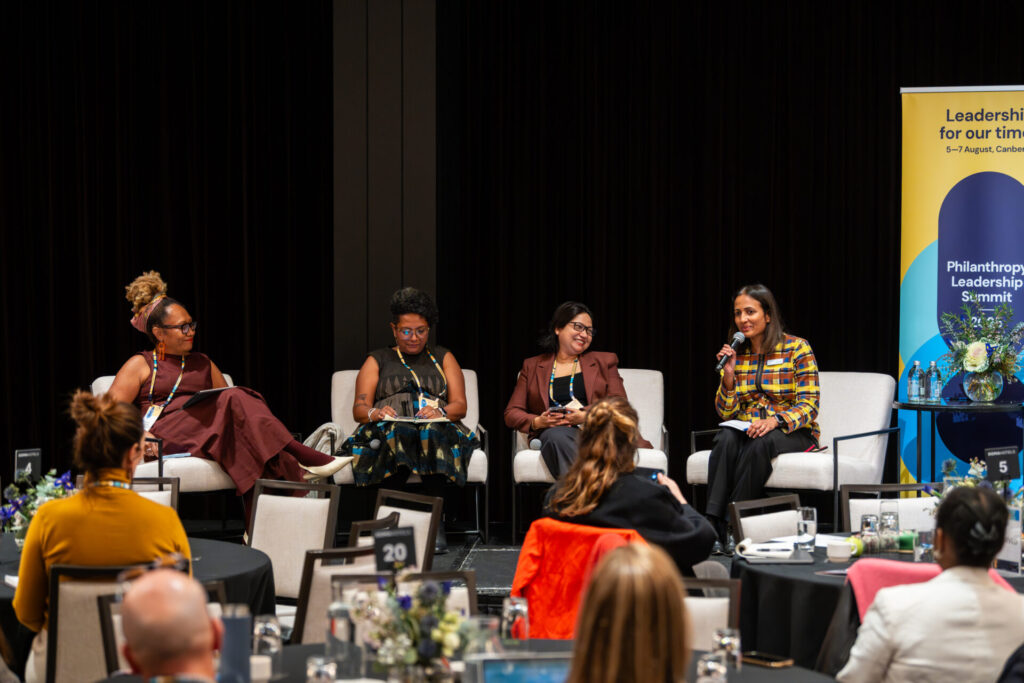
2. The crises are connected – is leadership? Collaborative leadership for social change in the region
Hosted by the ResourceFULL Collective: International Women’s Development Agency, Pacific Feminist Fund & Urgent Action Fund, Asia & Pacific.
Panellists: Nayomi Kannangara, International Women’s Development Agency, Michelle Reddy, Pacific Feminist Fund, Virisila Buadromo, Urgent Action Fund Asia Pacific.
Moderator: Lisa George, Macquarie Foundation.
Reflection provided by Chandni Dhingra, of the International Women’s Development Agency.
The ResourceFULL Collective led this powerful session, foregrounding regional perspectives from the Pacific at a critical moment.
The conversation brought together powerful women-of-colour leaders. Opening remarks from myself, as Strategic Advisor to the Collective, set the tone highlighting the Pacific’s significance as we navigate the polycrisis – on the frontlines of climate change and facing some of the worst gender-based violence rates globally. Yet, this region remains deeply underfunded.
The panel shared decades of lived and professional experience practicing collaborative leadership – reflecting on what it truly takes: analysing and sharing power, accountability to movements, and continually reflecting on who holds resources and why. They discussed friendship and joy as strategies, and creating consensus with relationships at the centre.
The room was energised and moved. Since then, the conversation has continued – especially around “collaboration without competition”. As Australia reflects on leadership and prepares to co-host Women Deliver 2026 with the Pacific, this session was a vital reminder that regional leadership must be centred – and that we can do more, together.
_____________________________________________________________________________
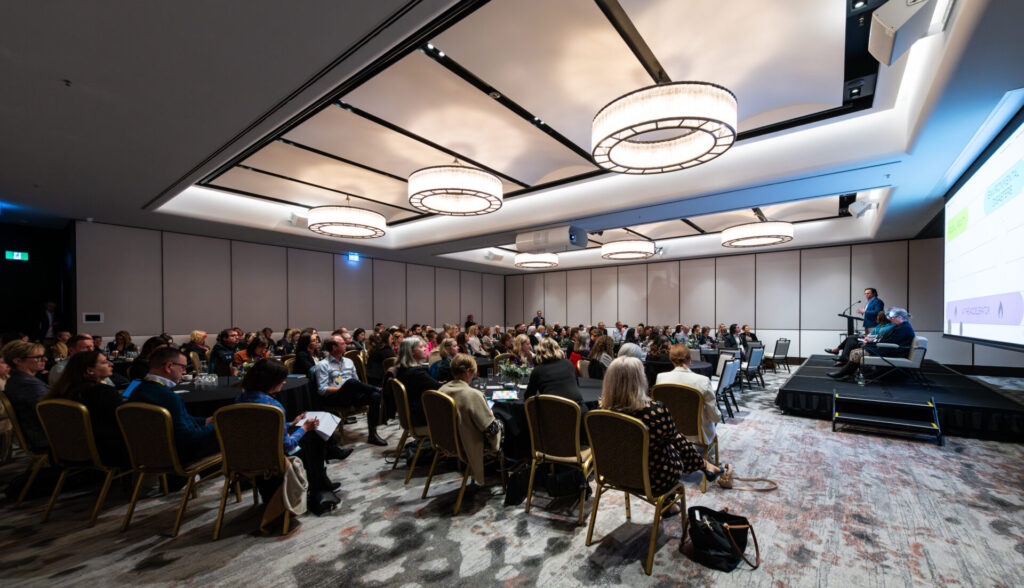
3. Power, purpose and the rise of AI: Why civil society, philanthropy and government must lead, not follow
Supported by the Minderoo Foundation.
Panellists: Tim Rosenlund-O’Brien, Make Good Measurement, Lani Evans, Fundsorter (NZ), Anthea Roberts, Dragonfly Thinking/ANU
Moderator: Liz Gillies, Menzies Leadership Foundation
We started the session by asking people to put their hands up if they were comfortable with using AI. There were around 200 people and only three put their hands up, so that set the scene for the really significant challenge we face as a sector.
We discussed that it’s not just how we can find efficiencies in working with AI, but how we scope and more deeply understand the cultural capability, governance and capital implications, for the community more broadly, but specifically for the community sector, for not-for-profits, government and civil society.
The speakers discussed the speed of light at which AI is developing. It’s not something we have years to plan for. It’s going to profoundly impact every facet of our lives and how we work. The sector needs adaptive skills and have ambition to step into those challenges to ensure that our voices collectively shape the future where AI unlocks philanthropy’s potential rather than diminishes it.
We are not well prepared and there is probably reluctance in the sector to engage. The fundamental shift we need to make is to think about it systemically versus programmatically, because our response needs to be multidimensional. The big message though was that AI also offers the sector huge opportunities, if we accept the challenge.
We asked ChatGPT what it thought and it gave a fulsome response, of which this is only part: “AI is transforming our world at astonishing speed. It has the power to heal or to harm, to liberate or to control. But here’s the truth. AI will not inevitably lead to a dystopian future. That outcome is not written in code. It’s shaped by human hands, human choices and human values …. AI is not destiny. The future is ours to write. Let’s write it with courage. Let’s write it with care. Let’s write it together.”
The sentiment in the room was to agree with AI!
_____________________________________________________________________________
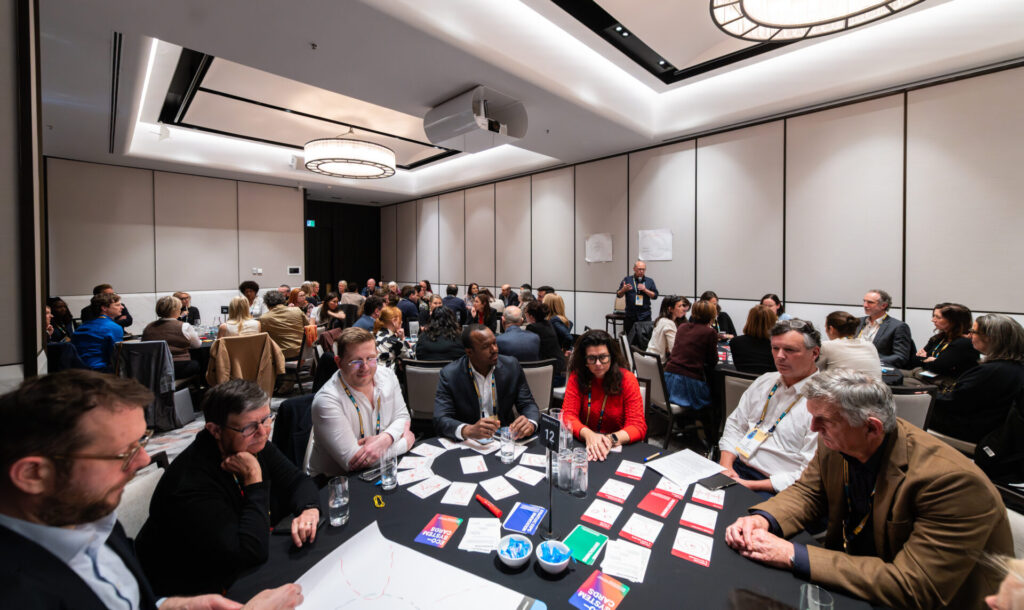
4. Community-led solutions: Relational leadership for systemic change
Hosted by Community Foundations Australia and supported by The Ross Trust.
Workshop Conveners: Darius Polok, International Alumni Center, iac Berlin and Sue Gold, Border Trust
Facilitators: Ian Bird, Community Foundations Australia, Dylan Smith, Community Foundations Australia.
Reflection jointly created by Sue Gold (Border Trust), Ian Bird and Dylan Smith (Community Foundations Australia), Kerry Farrance (Lord Mayor’s Charitable Foundation) and Ben Rodgers (Inner North Foundation).
The ‘Community-led solutions: Relational leadership for systemic change’ session was a packed, energised space exploring the transformative potential of shared leadership.
In an era of intersecting crises, we looked at how leadership can flip the script, putting relationships over hierarchy, networks over silos and elevate voices too often left unheard. Guided by international guest Darius Polok, the workshop was a hands-on adventure into ecosystem thinking.
The star? Ecosystem Cards. Simple cardboard, yet somehow a licence for “real talk.” They gave permission to slow down, trust the process and resist rushing to solutions – drawing out wisdom, sparking fresh perspectives and showcasing how authentic relationships and community-led action drive systemic change. As Darius reminded us, “all models are wrong, but some are useful”. Participants agreed – judging by the fact that people asked for multiple sets, we’re calling that a win.
The leadership reflections ran over time: conversations spilled into the hall until we were jostled out. The cards created space for learning with, not from one another – placing community firmly at the lead and philanthropy in service. Letting go of organisational ego, we discovered, opens space to do the right thing for the (eco)system we share.
_____________________________________________________________________________
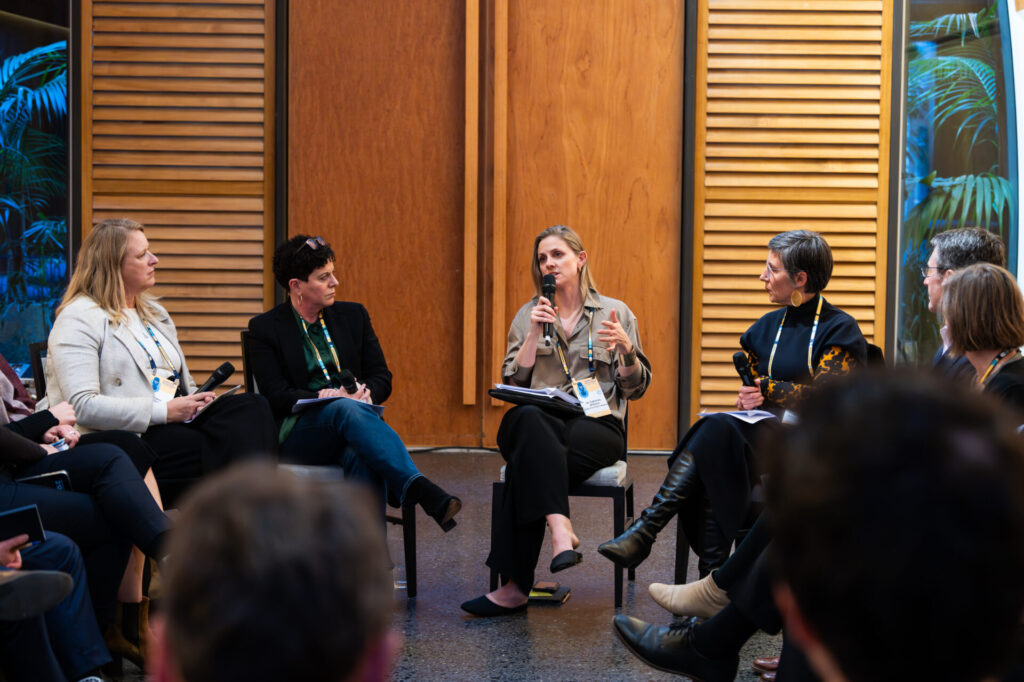
5. Safeguarding democracy: The leadership we need now
Hosted and supported by Mannifera.
Panellists: Deanne Weir, The WeirAnderson Foundation, Kylea Tink, former Independent MP, Dr Catherine Williams, Centre for Public Integrity
Reflection provided by Moderator: Harriet McCallum, EO, Mannifera.
What do a (former) community independent politician, civil society advocate and philanthropist working to safe-guard democracy all have in common?
They care deeply about the public good and the capacity for our democratic and economic systems to deliver it. They care about fairness and transparency in our political decision-making processes – for them to include community and civil society voices that represent us and advocate for all our interests.
They agree that it takes an informed and engaged citizenry to expect a high standard from our parliamentarians – those who listen to and respect those advocating for people and the planet over vested interests. And they agree on the critical importance of this advocacy being funded well beyond political cycles.
This is what a packed room of Summit attendees heard from a wonderful panel who shared their personal leadership experiences and reflections on the leadership we need now to safeguard our democracy.
…and what is the leadership that we need now? According to Kylea, Catherine and Deanne, it is humble, collaborative, inclusive, honest, has grace, empathy and is prepared to fight long-term for the public good.
Mannifera gets to work with and back leaders with these qualities in our collective endeavour for a fair democracy and economy. We welcome peers and colleagues in the philanthropic sector who value this kind of leadership and care about the democratic and economic systems that determine all we care about to join us.
_____________________________________________________________________________
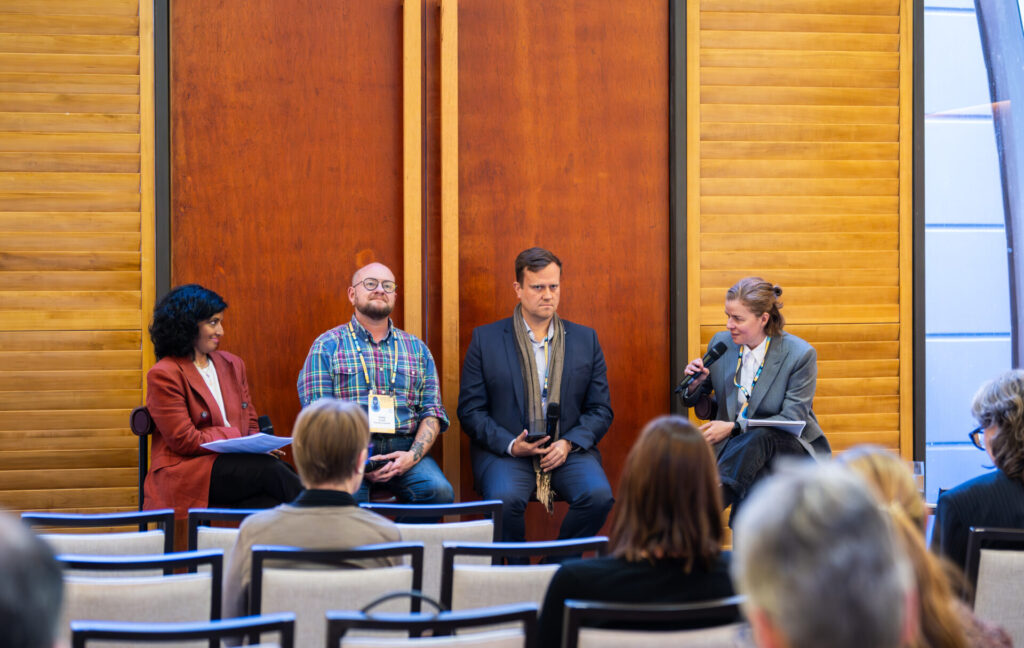
6. Holding the line: Philanthropy, inclusion and the anti-rights agenda
Hosted by the Global Philanthropy Project.
Panellists: Teddy Cook, Equality Australia, Somali Cerise, EB&Co, Dave Scamell, Global Philanthropy Project
Moderator: Catriona Fay, Perpetual.
Reflection by Dave Scamell, Global Philanthropy Project.
‘Holding the line: Philanthropy, inclusion and the anti-rights agenda’started with an overview of the global nature of the anti-rights movement, tracing its evolution from US-based Christian Right campaigns in the 1970s to today’s integrated, transnational network influencing policy and undermining democracy worldwide. Speakers underscored how anti-gender narratives — once rooted in opposition to feminist and reproductive rights — have been repackaged into anti-trans campaigns, serving as a wedge issue to erode civil society and consolidate authoritarian power.
The Australian context reflects these global patterns, with anti-LGBTQI+ groups rebranding post-marriage equality and strategically targeting trans people to divide communities. The discussion revealed a troubling funding gap — billions supporting anti-rights agendas versus a fraction for LGBTQI+ causes — and called for philanthropy to respond with courage, strategic clarity, and deep listening to affected communities.
Panelists stressed that attacks on gender equality, and LGBTQI+ rights are part of a broader anti-democratic project, linking to issues like reproductive health, climate action, and migration. Effective philanthropic response includes funders supporting cross-movement solidarity, shared strategies, and recognition that defending women’s and LGBTQI+ rights strengthens democracy itself.
Personal reflections grounded the conversation in lived experience, reminding us that leadership in this moment means challenging misconceptions, fostering empathy, and building coalitions that transcend identity silos to confront threats to our common democratic and human rights values in Australia and overseas.
__________________________________________________________________